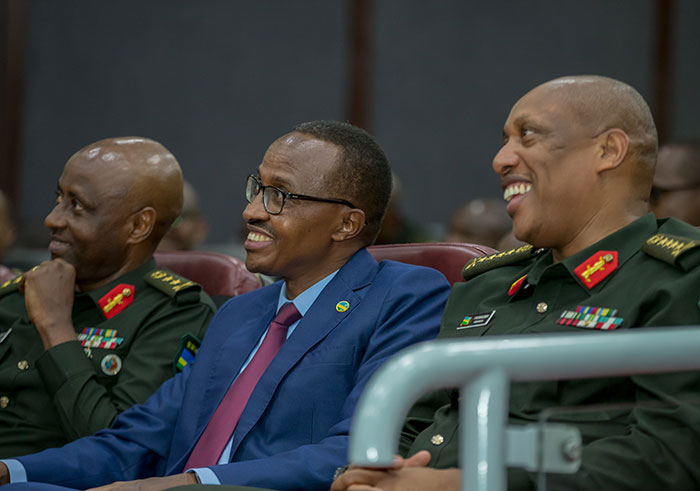

African countries should collaborate in seeking solutions to deal with contemporary security challenges.
The call was made by Rwanda’s Defense Minister, Maj General Albert Murasira, while officiating at the opening of the seventh National Security Symposium (NSS) at Rwanda Defence Force (RDF) Command and Staff College in Musanze District on Monday.
The three-day conference is organised by the college in collaboration with the National University of Rwanda. It seeks to tackle wide-ranging topics on security, including global power dynamics, the need to expand Africa’s defense capabilities and youth unemployment.
Other topics that will be discussed include strategies of dealing with cyber terrorism, enhancing continental self-reliance through intra-continental trade as well as the role of good governance in in achieving socio-economic transformation.
Speaking during the opening of session, Murasira said that the symposium was an opportunity to bring together experts to deliberate on contemporary security issues, necessary need for accomplishing nation building.
"As a continent, we cannot wait to have the classical and conventional means to deal with our problems. We must find home grown solutions within our own means and move forward and make sure we do not go back to the failure of the past,” he said.
He added; "Let us be more imaginative, creative and pragmatics in finding solutions to our problems. Our deliberations should be workable and practicable in the African context.”
Africa, he said was being challenged by various challenges such as youth unemployment, vulnerability of civilians in conflict, expansion of terrorism and cyber threats on continent. The consequences of such threats, he added, tend to affect everyone in different ways and proportions.
"It is therefore important that we work together in a mult- dimension context which covers national, international as well as inter-agency engagement,” he added.
The minister said that contemporary security challenges were dynamic and complex and hence required continental or regional initiatives rather than focusing on individual state capacities.
"We believe that real security goes beyond sending troops to affected areas, it should include participating in post conflict recovery and bringing the social divide that triggered the conflict to begin with,” he added.
National Security Symposium 2019 participants include 47 RDFCSC students, the Faculty and Staff, alumni, high profile government and international officials, RDF Generals and senior officers as well as accredited national and external academics with vast experience.
The students are from Ethiopia, Ghana, Kenya, Malawi, Nigeria, Rwanda Senegal, Tanzania, Uganda and Zambia.
Discussions will enrich participant to understand continental and global security issues, according to the statement.
The first session was titled: Power dynamics between Rassia, China and the Western World: Implications on Security and Development in Africa.
It included panelists such as General James Kabarebe, the Senior Presidential Advisor on security, Justice and Attorney General Johnston Busingye, Minister for Infrastructure Amb. Clever Gatete and Prof Adebayo Olukoshi.
Other speakers expected to speak include RDF Chief of Defence Staff Gen Patrick Nyamvumba, Dr Donald Kaberuka, Prof Patrick Loch Otieno Lumumba and other notable speakers will share their thoughts and expertise on various subjects like Consensual Versus Adversarial Politics in the Pursuit of Sustainable Peace, Stability and Development in Africa and many more.
Others include Eugene Kapersky, the Russian cybersecurity expert and CEO of Kaspersky Lab.
Kapersky will lead a session under the theme, "Cyber Terrorism; A Threat to National Security: Deterrent Measures and Mitigating Strategies.


